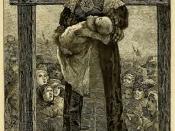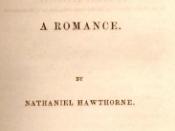The Scarlet Letter: The effect of a place upon those who live in itThe rigid and highly judgmental beliefs found in the Puritan religion shapes the society of Boston in Nathaniel HawthorneÃÂs The Scarlet Letter. SocietyÃÂs obsession with dismal Puritanical ideals are the chief reasons for Hester, Pearl, and DimmesdaleÃÂs suffering. Boston and its callous, Puritan society renders Hester cold and emotionless, drives Pearl to grow up mischievous and complacent, and tortures Arthur Dimmesdale into a state of emotional turmoil.
Hester becomes emotionally hardened by the constant harassment that is bestowed upon her. Each day ÃÂ[brings] its own trial with it; so [does] the next day and so [does] the nextÃÂ (Hawthorne, 31). Every day in HesterÃÂs life is another trial. When the townspeople view the ostentatious scarlet letter ÃÂAÃÂ pinned to HesterÃÂs bosom, it essentially reiterates the fact that she has sinned and committed the crime of adultery.
Whenever Hester finds herself in these social settings, ÃÂthere [is] nothing that [makes] her feel as if she [belongs] in societyÃÂ (37). Hester constantly is harassed by all members of society, even the poor women she does charity work for.
Hester punishes herself during her day to day life as well. She makes it a point to live a simple life free of riches and extravagant material objects. She rejects her talent at needlework and her taste for beautiful objects as sin. ÃÂThis morbid meddling of conscience with an immaterial matter betokened, it is to be feared, no genuine and steadfast penitence, but something doubtful, something that might be deeply wrong, beneathÃÂ (37). Hester feels extremely guilty for her adulterous past. Her conscience even gets to the point where she condemns anything that makes her happy because she views it as sin.
Ironically, Hester can not even find acceptance in church; the staple of Puritan society. The ministers ridicule her and often make her ÃÂthe text of the discourseÃÂ (38). Hester simply desires to go to church and repent her sins like every other model citizen in Puritan society. Instead, she is cruelly made an example of and becomes ostracized even further from mainstream society. This is yet another example of the deviation between HesterÃÂs view of sin and that of Puritan society. Hester believes that her sin can make her stronger and can be placated through good deeds and pure devotion. Puritan society fears sin in general and feels that it should be suppressed by ostracizing Hester.
PearlÃÂs mischievous demeanor is surely a product of her surroundings yet it is almost hereditary in a figurative sense. Pearl is ÃÂan imp of evil, emblem and product of sinÃÂ (45). The Puritans believe such a child undoubtedly possesses a difficult, unruly demeanor because she is the child of the devil. Realistically, Pearl gains her mischievous and complacent persona due to the poor treatment she receives from the local children. They tease her unceasingly, mimicking the harsh words of their parents. Unlike Hester, Pearl does not accept ridicule very easily and ÃÂ[requites] it with the bitterest hatred that can be supposed to rankle in a childish bosomÃÂ (46). She even grows violent and throws stones at the other children much to their peevish delight.
Hester attempts to protect Pearl from the influence of Puritan society by raising her in the countryside outside of Boston. In essence, Pearl becomes more socially ostracized from the other children. She makes friends according to the metaphor, ÃÂa torch kindles a flame wherever it may be appliedÃÂ (46). Pearl is harassed by the other children to such an extent that she looks for friendship in the most pitiful of places. Pearl finds solace in nature specifically in ÃÂa stick, a bunch of rags, and a flowerÃÂ (46). The speaker compares PearlÃÂs life to a brook ÃÂinasmuch as the current of her life gushed from a wellspring as mysterious, and flowed through scenes shadowed as heavily with gloomÃÂ (141). Having nature as a plaything invokes a false sense of grandeur. Pearl is not accepted by the Puritan youth so she is sadly forced to amuse herself with inanimate objects found in nature because they are the only things that wonÃÂt judge and ridicule her.
Arthur Dimmesdale suffers internally from the influence of society. His secret sin and guilt have led to the deterioration of his health. Dimmesdale has the love and support of his congregation yet he feels like he does not deserve it. He punishes himself as a result of this. The speaker describes a bloody scourge Dimmesdale uses to whip himself. Additionally, Dimmesdale ÃÂfasts-not to purify the bodyÃÂ but rigorouslyÃÂ as an act of penanceÃÂ (96). Dimmesdale physically hurts himself because he sees the hardship Hester has to endure. He is distraught with guilt about his own sins and their painfully visible implications on Hester.
Even as his health deteriorates, DimmesdaleÃÂs sermons become seemingly more powerful towards the end of the novel. Guilt over his secret sin allows him to empathize with sinners in his congregation. DimmesdaleÃÂs adultery is the ÃÂvery burden it was that gave him sympathies so intimate with the sinful brotherhood of mankindÃÂ so that his heart vibrated in unison with theirs, and received their pain into itself, and sent its own throb of pain through a thousand other hearts, in gushes of sad, persuasive eloquenceÃÂ(94). Dimmesdale could hardly bear the guilt from acting as the spiritual leader of a whole congregation when he, himself was impure. He attempted to confess within his sermons yet the congregation simply interpreted his confession of sin as figurative. The congregation does not want to believe that their spiritual leader is a sinner simply because it goes against the societal norm.
The setting of The Scarlet Letter has an vast impact on its characters. The strict Puritan doctrine found in Boston raises an uproar over HesterÃÂs adulterous acts. She is harassed and ostracized despite her matronly charity work within the town. HesterÃÂs daughter, Pearl is an extension of HesterÃÂs sin. She is treated equally as poor by the town children and is regarded as a child of the devil by the town elders. PearlÃÂs demeanor is ghastly as a result of this and her only friends are found within the comforting boundaries of nature. Arthur Dimmesdale physically deteriorates and experiences immense inner turmoil in regards to his guilt. He cannot bear the thought that he is acting as impure leader of his congregation. Additionally, he feels guilty about the hardship which Hester is forced to face every day she wears the scarlet letter. Had Boston been a less rigid and non-Puritan town, a story of despair and ignominy, such as The Scarlet Letter, would most certainly not have taken place.
Works CitedHawthorne, Nathaniel. The Scarlet Letter. Austin: Holt, Rinehart, and Watson. .





